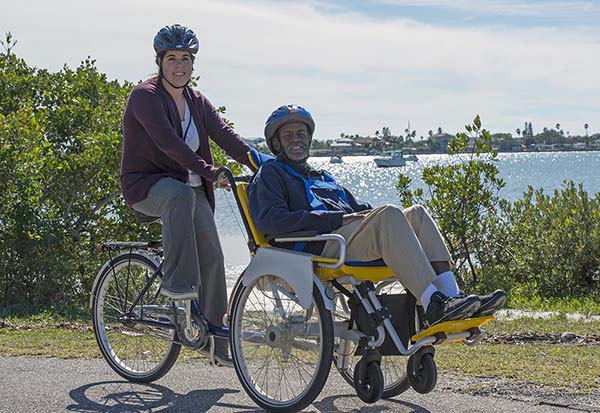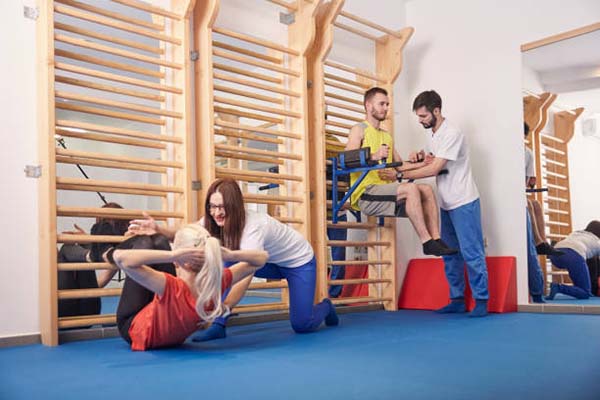Recreational therapy is a type of therapy that uses recreational activities to help people improve their physical, mental, and emotional well-being. It is a form of therapy that is used to help people with a variety of conditions, including mental illness, physical disabilities, and substance abuse.
The goal of recreational therapy is to help people improve their quality of life by engaging in activities that are enjoyable and meaningful to them. This can include activities such as sports, art, music, and dance. Recreational therapy can be used in a variety of settings, including hospitals, rehabilitation centers, and community centers.
By participating in recreational therapy, people can improve their physical abilities, develop new skills, and build relationships with others. It can also help to reduce stress, improve mood, and increase self-esteem.
Overall, recreational therapy is a valuable tool for improving the health and well-being of individuals who are struggling with a variety of conditions.
What is Recreational Therapy?
Recreational therapy is a healthcare profession that uses leisure activities to help people with disabilities or illnesses improve their physical, cognitive, emotional, and social functioning.
Recreational therapists work with individuals of all ages and abilities to develop treatment plans that incorporate activities such as sports, games, arts and crafts, music, and outdoor adventures.
Through these activities, recreational therapy can help individuals achieve a wide range of goals. For example, it can help improve physical strength and endurance, reduce stress and anxiety, enhance social skills, and increase self-esteem.
Recreational therapists use a client-centered approach, which means that they work closely with individuals to identify their strengths, interests, and needs, and then tailor activities to meet those specific goals. They also collaborate with other healthcare professionals, such as doctors, nurses, and occupational therapists, to ensure that treatment plans are comprehensive and effective.
To become a recreational therapist, individuals typically need to earn a bachelor’s degree in recreational therapy or a related field. They may also need to obtain certification from the National Council for Therapeutic Recreation Certification (NCTRC) to practice in certain settings, such as hospitals or rehabilitation centers.
Benefits of Recreational Therapy
Physical Health
Recreational therapy can have numerous benefits for your physical health. Participating in recreational activities can help improve your cardiovascular health, increase your strength, and improve your overall physical fitness. Engaging in activities such as swimming, hiking, and dancing can help you burn calories and improve your endurance. Recreational therapy can also help you improve your balance, coordination, and flexibility, which can help reduce your risk of falls and injuries.
Mental Health
Recreational therapy can also have a positive impact on your mental health. Participating in recreational activities can help reduce stress, anxiety, and depression. Recreational therapy can help you improve your mood, boost your self-esteem, and increase your overall sense of well-being. Engaging in activities such as art therapy, music therapy, and pet therapy can help you express your emotions, reduce your feelings of isolation, and improve your social skills.
Social Skills
Recreational therapy can also help you improve your social skills. Participating in recreational activities can help you meet new people, build relationships, and improve your communication skills. Recreational therapy can help you improve your teamwork skills, learn how to work with others, and improve your problem-solving skills. Engaging in activities such as group therapy, sports, and games can help you develop your social skills and build your confidence.
Methods of Recreational Therapy
Recreational therapy is a form of therapy that uses leisure activities to enhance physical, cognitive, emotional, and social functioning. There are various methods of recreational therapy, and each one has its unique benefits. Below are some of the most common methods of recreational therapy.
Outdoor Activities
Outdoor activities are a popular form of recreational therapy. They provide opportunities for physical exercise, fresh air, and exposure to nature. Some of the most common outdoor activities used in recreational therapy include hiking, camping, fishing, and gardening. Gardening is particularly beneficial for individuals with physical disabilities, as it can help improve hand-eye coordination, strength, and endurance.
Arts and Crafts
Arts and crafts are another popular form of recreational therapy. They provide opportunities for creative expression and can help improve fine motor skills, visual-spatial skills, and cognitive functioning. Some of the most common arts and crafts used in recreational therapy include painting, drawing, pottery, and jewelry making.
Aquatic Therapy
Aquatic therapy is a form of recreational therapy that takes place in a pool or other body of water. It is particularly beneficial for individuals with physical disabilities, as the buoyancy of the water can help reduce stress on the joints and muscles. Aquatic therapy can also help improve cardiovascular health, balance, and coordination.
Drama Therapy
Drama therapy is a form of recreational therapy that uses drama techniques to help individuals improve their emotional and social functioning. It can help individuals develop communication skills, empathy, and self-awareness. Drama therapy can take many forms, including role-playing, improvisation, and storytelling.
Animal-Assisted Therapy
Animal-assisted therapy is a form of recreational therapy that involves interactions with animals, such as dogs, cats, or horses. It can help improve social skills, reduce anxiety and depression, and promote relaxation. Animal-assisted therapy can take many forms, including petting, grooming, and taking care of animals.
In conclusion, recreational therapy is a valuable form of therapy that can help improve physical, cognitive, emotional, and social functioning. There are various methods of recreational therapy, each with its unique benefits. Outdoor activities, arts and crafts, aquatic therapy, drama therapy, and animal-assisted therapy are all effective methods of recreational therapy that can help individuals achieve their therapeutic goals.
Conclusion
Recreational therapy is a valuable approach to improving the physical, emotional, and mental well-being of individuals. By engaging in activities that are meaningful and enjoyable, you can improve your quality of life and enhance your overall health.


